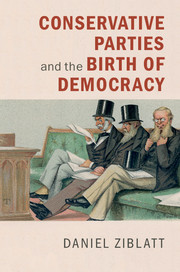Conservative Parties and the Birth of Democracy
Part of Cambridge Studies in Comparative Politics
- Author: Daniel Ziblatt, Harvard University, Massachusetts
- Date Published: April 2017
- availability: Available
- format: Hardback
- isbn: 9781107001626
Hardback
Other available formats:
Paperback, eBook
Looking for an inspection copy?
This title is not currently available for inspection. However, if you are interested in the title for your course we can consider offering an inspection copy. To register your interest please contact [email protected] providing details of the course you are teaching.
-
How do democracies form and what makes them die? Daniel Ziblatt revisits this timely and classic question in a wide-ranging historical narrative that traces the evolution of modern political democracy in Europe from its modest beginnings in 1830s Britain to Adolf Hitler's 1933 seizure of power in Weimar Germany. Based on rich historical and quantitative evidence, the book offers a major reinterpretation of European history and the question of how stable political democracy is achieved. The barriers to inclusive political rule, Ziblatt finds, were not inevitably overcome by unstoppable tides of socioeconomic change, a simple triumph of a growing middle class, or even by working class collective action. Instead, political democracy's fate surprisingly hinged on how conservative political parties – the historical defenders of power, wealth, and privilege – recast themselves and coped with the rise of their own radical right. With striking modern parallels, the book has vital implications for today's new and old democracies under siege.
Read more- Proposes a new approach to the study of European democratization, highlighting a previously understudied actor in this process - conservative political parties - and filling a major gap in the existing literature
- Assembles an original array of archival and other primary evidence to challenge the dominant approaches to the study of democratization in Britain and Germany
- Written in clear, accessible prose, addressing contemporary themes in democratic countries, such as the threat posed to conservative parties by right-wing populist movements
Awards
- Winner, 2018 Woodrow Wilson Foundation Award, American Political Science Association
Reviews & endorsements
'Daniel Ziblatt has written an incredibly important book about the development of democracy in Europe. Based on in-depth qualitative research and extremely innovative use of quantitative data, he has given us a new picture of German and British political development in particular. Focusing on opponents of democratization, Ziblatt asks why anti-democratic elites accepted democratization in some places (like Britain) but vociferously and often violently opposed it in other places (like Germany). Ziblatt points to the strength of conservative parties as the key variable. This book will be invaluable to anyone interested in European political history, democratization more generally, and the ways in which thoughtful historical research can illuminate contemporary debates.' Sheri Berman, Barnard College, New York
See more reviews'Daniel Ziblatt revolutionizes the literature on democratic transitions by linking it to subsequent democratic breakdown, and shows that it is the nature of conservative party organization that determines democracy's long-run stability. His focus on democracy's 'first wave' in the nineteenth century carries enormous implications for the future of democracy today.' Francis Fukuyama, Olivier Nomellini Senior Fellow, Freeman Spogli Institute for International Studies, Stanford University, California
'This book profoundly improves our understanding of historical regime trajectories. Only where inclusive, encompassing, and centralized conservative parties created a centripetal dynamic that could sideline reactionary challenges could regime change progress incrementally toward democracy. And only there, democracy proved resilient against renewed authoritarian challenges in the twentieth century. Unfortunately, Ziblatt's book may also have timely implications for twenty-first century challenges to democracy.' Herbert Kitschelt, George V. Allen Professor of International Relations, Duke University, North Carolina
'This is the best book in comparative politics I have read in a decade. Conservative Parties and the Birth of Democracy is a book of stunning erudition and deep learning. It has profound implications for how we think about democratic development and dictatorship virtually everywhere in the world.' Jeffrey Kopstein, Chair of the Political Science Department, University of California, Irvine
'With immensely erudite historical comparison, quantitative evidence, and probing archival research, Daniel Ziblatt demonstrates that the organizational capacity of conservative elites makes the crucial long-term contribution to preserving liberal democracy. He has, I fear, written the political parable for our own times.' Charles S. Maier, Leverett Saltonstall Professor of History, Harvard University, Massachusetts
'First we had Capital in the Twenty-First Century, now we have Barrington Moore.' James Robinson, Harris School of Public Policy, University of Chicago
'… Conservative Parties and the Birth of Democracy is written in fire. It delves deep into long-forgotten electoral histories to emerge with insights of Tocquevillian power, to illuminate not only the past but also the present and future.' David Frum, The Atlantic
'Ziblatt's well-written and astute analysis is of interest both to professional political scientists and historians and a wider audience of anyone curious about the course of European democratization.' Hermann Beck, The Journal of Modern History
'The book contains a plethora of fascinating empirical analyses … it is a wonderful read, and I found myself so engrossed, especially in the German chapters, that I had a hard time putting the book down.' Jørgen Møller, Commonwealth & Comparative Politics
'All in all, the book's scope is impressive. The author not just compares the development of conservative parties in Germany and the UK but also includes short side views about other European and even non-European countries to support his arguments.' Frieder Gunther, American Historical Review
'… the book's scope is impressive. The author not just compares the development of conservative parties in Germany and the UK but also includes short side views about other European and even non-European countries to support his arguments. Daniel Ziblatt has added a viable argument to the debate on the survivability of democracies in the twentieth and twenty-first centuries, which helps us to better understand why some countries were more inclined to choose anti-parliamentarian alternatives than others.' Frieder Gunther
'Ziblatt's book offers a plethora of empirical examples analyzed through fascinating datasets collected from a wide range of sources (from memoires to census and parliamentary reports). The micro-level evidence for the case studies presents an insightful and detailed comparative historical analysis. The crafted use of nested analysis (quantitative and qualitative) for his case studies vividly presents the importance of center-right parties for democratization in Western Europe.' Zdravko Veljanov, Zeitschrift für Vergleichende Politikwissenschaft
'… a brilliant scholarly work …' Fareed Zakaria, The Washington Post
Customer reviews
Not yet reviewed
Be the first to review
Review was not posted due to profanity
×Product details
- Date Published: April 2017
- format: Hardback
- isbn: 9781107001626
- length: 448 pages
- dimensions: 235 x 157 x 29 mm
- weight: 0.75kg
- availability: Available
Table of Contents
1. Two patterns of democratization
2. The old regime and the conservative dilemma
3. From 1688 to mass politics: British democratization
4. A virtuous cycle? Conservative strength and Britain's settled path, 1884–1906
5. Averting a democratic disaster in Britain, 1906–1922
6. Weak party conservatism and the case of Germany
7. Stalled democratization in Germany before 1914
8. The unsettled path: conservative weakness in Weimar Germany, 1918–1928
9. A deluge: conservative weakness and democratic breakdown in Germany
10. How countries democratize: Europe and beyond
11. Conclusion.
Sorry, this resource is locked
Please register or sign in to request access. If you are having problems accessing these resources please email [email protected]
Register Sign in» Proceed
You are now leaving the Cambridge University Press website. Your eBook purchase and download will be completed by our partner www.ebooks.com. Please see the permission section of the www.ebooks.com catalogue page for details of the print & copy limits on our eBooks.
Continue ×Are you sure you want to delete your account?
This cannot be undone.
Thank you for your feedback which will help us improve our service.
If you requested a response, we will make sure to get back to you shortly.
×







